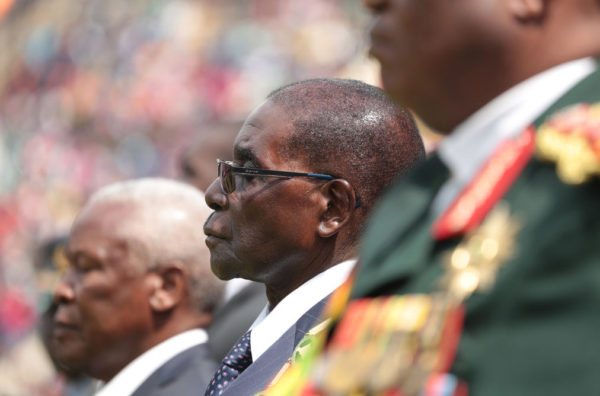PBS: Escaping Eritrea … [Read More...] about ካብ ውሽጢ ቤት ማእሰርታት ኤርትራ
Converting tweets into feet: can Zimbabwe’s social media activism oust Robert Mugabe?
Protests against the rule of Zimbabwe’s ageing president, Robert Mugabe, have become commonplace in recent months. In one of the latest incidents on August 24, police used tear gas and water cannons to disperse a “Mugabe Must Go” protest in the capital Harare.
In April, Evan Mawarire, an unknown pastor, inadvertently started a wave of online activism when he started the #ThisFlag movement in a pleading Facebook post. Within hours, copycats had appeared online and the ZANU-PF regime found itself party to an upsurge in online and offline criticism.
Since then social media activism in Zimbabwe has ignited. WhatsApp, a mobile messaging service that is frequently subscribed to in a prepaid form in Zimbabwe, has been widely used as a tool to mobilise. It accounts for 34% of all mobile data use in Zimbabwe. Facebook reports 260,000 daily users, of 890,000 Zimbabweans online, but this only accounts for 3% of mobile broadband usage in the country. Newsday Zimbabwe, an independent news outlet, increased its Twitter network by 10,000 followers in the past month alone.
The ruling ZANU-PF responded to this upswell by drafting new legislation, the Computer Crime and Cyber Crime Bill, to control online activism. But it might find it difficult to keep track of services such as WhatsApp, which now operate with end-to-end encryption making them very hard to keep track of.
Social protest
Protests coordinated on social media have emerged in recent weeks throughout the country addressing issues from socio-economic governance, to the introduction of bond notes (a cash substitute in the country which no longer has its own currency), corruption, and frustration by graduates at a lack of employment opportunities. When groups do mobilise on Zimbabwe’s streets, protests have increasingly been challenged by riot police using tear gas and water cannons.

These protests are different from previous efforts to challenge the government’s record in Zimbabwe. Social media mobilisation is more fluid and dynamic than traditional protests, such as trade union strikes, that tend to require the building of solidarity and a common position among workers in an industry. Previous anti-regime protests, such as those by the Movement for Democratic Change, have a traditional leader and grassroots form. It has been easy for the regime to identify and pick off individual leaders such as the opposition figure Morgan Tsvangirai before the 2008 election, leaving movements temporarily rudderless.
The leaderless, issue-driven format of social media protest is different. It works best when organised and executed quickly, and when responding to a crisis. This fluidity makes it difficult for the state to track, but it can also pose difficulties for the social movements, which can quickly lose momentum as activists lose motivation. The strength of new movements can become their downfall if not managed well.
Legal clampdown
Growth of social media has happened in a political environment that has become more and more hostile. On August 5, all mobile phone operators suspended data promotions meaning that internet access became significantly more expensive in Zimbabwe.
Two days later the government announced draft legislation to address so-called cyber-terrorism. The draft law contains provisions that deal with the use of digital platforms to incite violence and to cause civil unrest that could undermine future mobilisation.
Although mobile operators have offered little explanation about why data promotions suddenly stopped, the near-simultaneous introduction of cybercrime legislation smacks of state attempts to curtail freedom of expression.
All this feels familiar. In previous periods of anti-government mobilisation and during elections, ZANU-PF successfully used both state-sponsored violence in combination with legislative tools to quell public protest. In the early 2000s, the government introduced legislation aimed at restricting mobilisation, including the 2003 Access to Information and Protection of Privacy Act to control the press, and the Public Order and 2002 Security Act to monitor and break up public meetings. These tools routinely undermine human rights including freedom of expression and assembly.
In 2012, the government charged six people with treason for organising and attending a lecture to learn lessons from the Arab Spring. Although the charges were later dropped, it is clear that ZANU-PF is sensitive to the impact that free expression could have on the stability of the regime.
The state of ZANU-PF
ZANU-PF faces this upsurge of mobilisation in the midst of a party crisis. Mugabe is 92-years-old and his party is beset by factionalism with rivals vying for position as his successor. A diverse political opposition is developing, formally rooted in ZANU-PF itself. The former vice president, Joice Mujuru, recently launched Zimbabwe People First party to challenge ZANU-PF in the upcoming 2018 elections.
In late July, a group of war veterans from Zimbabwe’s liberation struggle, historically a core support base for ZANU-PF, condemned Mugabe’s running of the country. ZANU-PF’s current structure lacks the organisational stability to effectively manage such dynamic threats to the regime.
This situation could bode well for the demise of authoritarianism in Zimbabwe. A majority of the population, around two-thirds, are now “born frees” – Zimbabweans with no memory of the liberation struggle before 1980. Even though the regime regularly uses rhetoric that plays on ZANU-PF’s part in the liberation victory to maintain support, this strategy is losing ground, shown by the groundswell of on and offline protest among Zimbabwe’s disaffected youth. Nonetheless, Mugabe has successfully mobilised ZANU-PF youth league members to counter anti-government protests.
The coming months hold enormous potential for political change in Zimbabwe. ZANU-PF’s hold on power is tenuous and both physical and digital repression may not be enough to quell the tide of discontent rocking the regime. Instead, the power of social media may be an effective tool to undermine the already cracked foundations of ZANU-PF and contribute to the development of a more democratic political framework in Zimbabwe.
Research Fellow, African development and democracy, University of Sussex.
